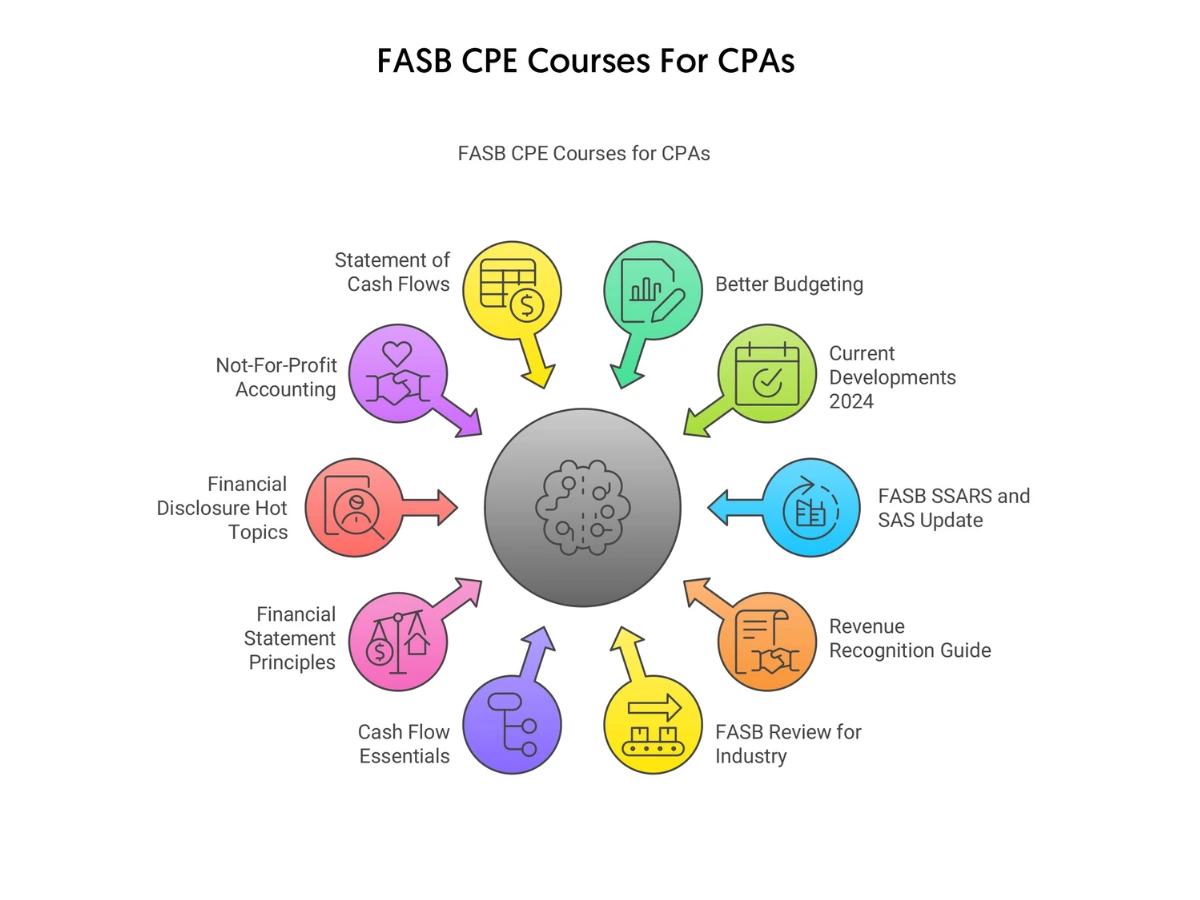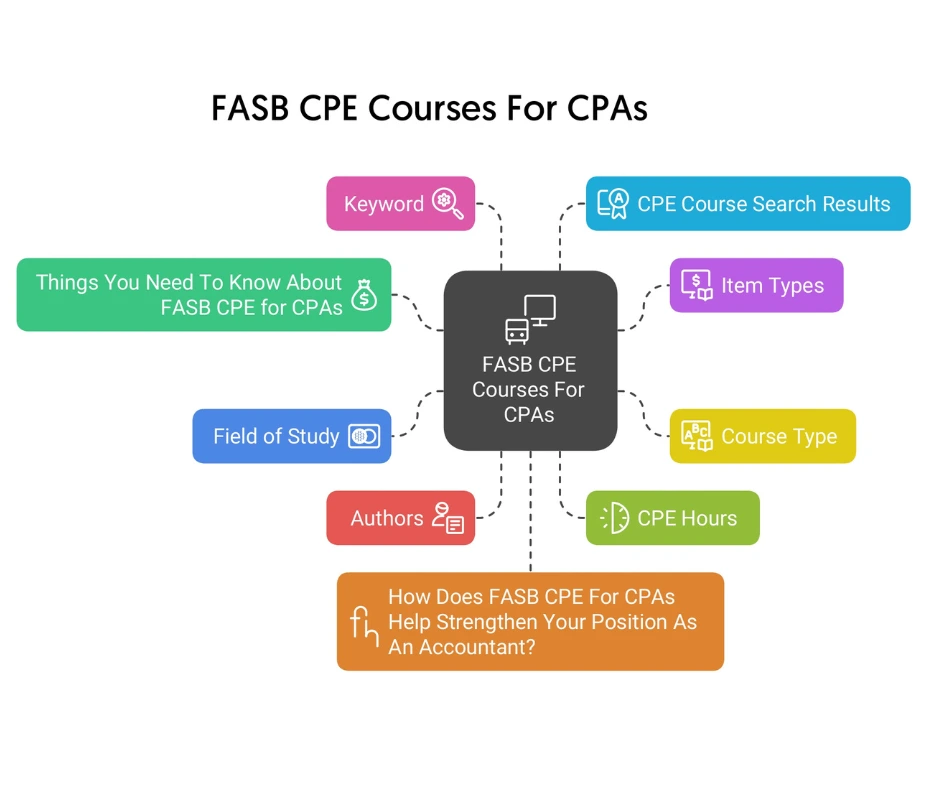FASB CPE Courses For CPAs |
| The Last Self-Study CPE Website You Will Ever Need (Click for Subscriptions) |
This page lists FASB CPE courses tailored for CPAs and accountants seeking to stay current with GAAP standards and FASB updates. Each course strengthens professional competency in financial reporting, compliance, and ethical accounting practices. Offered online through CPEThink.com, these flexible self-study courses help professionals meet their continuing education requirements while mastering the latest FASB guidance relevant to 2025 and beyond.

1. Who is this list of CPE courses for?This list of FASB CPE courses is designed for Certified Public Accountants (CPAs), accountants, and other financial professionals who prepare, review, or audit financial statements in accordance with U.S. GAAP, including those working with public companies, private entities, and nonprofits.
2. What is this list of CPE courses about or what problem does this course solve?These courses provide in-depth instruction on Financial Accounting Standards Board (FASB) standards, addressing common challenges in areas such as revenue recognition, leases, credit losses, and current reporting updates, helping professionals maintain compliance with evolving accounting principles.
|
3. Why is this list of CPE courses important to a CPA, Accountant, or IRS Enrolled Agent?FASB CPE courses are vital for staying current with GAAP updates and ensuring the accuracy, transparency, and comparability of financial statements, which enhances professional credibility and reduces the risk of reporting errors or noncompliance.
4. When is this list of CPE courses relevant or timely?This list is especially relevant for 2025 and beyond, as it includes courses covering the most recent FASB updates, such as new standards on leases, financial instruments, and COVID-19 related reporting developments.
|
5. Where can this list of CPE courses be found and accessed?These courses are available online at CPEThink.com, where users can browse, purchase, and complete self-study programs directly through the website at their own pace.
6. How is a list of CPE courses like this consumed or used?CPAs select and complete these self-study or video-based courses to earn continuing education credits, meet state licensing requirements, and apply updated accounting standards in real-world reporting and auditing scenarios.
|
Do you work for or offer services to a publicly-traded company that must adhere to GAAP (Generally Accepted Accounting Principles)? Or, are you engaged with a privately-owned company that’s planning to follow GAAP? In both cases, pursuing FASB CPE for CPAs can give your career a big boost.
The FASB (Financial Accounting Standards Board) is a non-governmental, independent body that establishes accounting reporting standards for public and private organizations and nonprofits in the U.S. And these accounting standards follow GAAP.
In this post, we’re going to discuss various essential aspects of FASB CPE courses to help you make an informed decision.
While adhering to GAAP isn’t mandatory for private companies, many of them in the U.S. do follow it. This is because filing GAAP-compliant financial statements becomes extremely useful when a private company wants to obtain loans or other types of financing. Financial institutions and investors can easily determine its financial health by looking at these financial statements.
Therefore, by taking FASB CPE courses for CPAs, not only can you expedite your professional growth but also open up a plethora of opportunities.
You may have heard that many people consider financial accounting as the language of business. This is because business owners use financial accounting to communicate their company’s financial health to external parties like creditors and shareholders.

If you can improve your knowledge in FASB standards and demonstrate that expertise when preparing clients’ financial statements, you can easily become a crucial part of their business. Here’re some specific benefits of pursuing FASB CPE for CPAs online or offline.
· Trustworthiness of financial statements
A company’s stakeholders often depend on the data provided by its financial statements to make their decisions. Potential investors also finalize their investment decisions by reviewing those financial statements. By applying your knowledge gained from offline or online FASB CPE for CPAs, you can ensure those statements are trustworthy and reliable.
· Prevention of accounting manipulations and frauds
We’ve already discussed that for public companies and nonprofits in the U.S., it’s a must to follow GAAP. The rules and regulations of preparing GAAP-compliant financial statements make it extremely difficult to manipulate financial data and to commit any fraud.
· Comparability
Since all entities, which are required to adhere to GAAP, follow the same accounting standards, doing a comparison between them becomes much easier. The users of these entities’ financial statements can easily analyze and compare their financial performances before making any decision.
Before short-listing online FASB CPE courses, it’s important to have a clear idea of what your learning objectives should be. Let’s take a quick look at some of the key ones:
· Current reporting issues (particularly issues related to COVID-19)
Ever since COVID-19 struck, businesses and professionals have seen financially turbulent times that were filled with a lot of change and chaos. Additionally, there have been several questions and concerns related to reporting issues with respect to COVID-19-related changes and updates. With FASB CPE for CPAs online, you’ll be better equipped to deal with such reporting issues and concerns. Whether it’s about treatment and compliance considerations of PPP loans, handling events occurring after the reporting period, or adhering to the recently issued accounting standards and updates, you will be better equipped to deal with all of them.
· Revenue recognition
For years, this has triggered audit failures and been under the limelight for causing corporate abuse and fraud allegations. With FASB CPE courses, you’ll be able to gain an in-depth knowledge of the framework for revenue recognition, which is constructed around the core principle that’s applied in a five-step process. This five-step process helps an entity identify revenue based on what’s being exchanged and when. Your CPE courses would also facilitate your understanding of the changes along with new requirements that are vital for the successful implementation of the new standard. Ideally, you should choose an online FASB CPE course provider that supports your learning with practical examples, thus helping you steer clear of revenue recognition traps while providing you with the latest FASB guidance. Such a course would also let you understand the way the new guidance would impact specific industries due to certain new criteria for identifying revenue and changes in disclosure requirements.
Leases
With its recently issued standard, the FASB aims to improve its accounting rules for leases applicable to a lessor’s accounting for particular leases with changeable lease payments. Earlier, a lessor could be required to recognize a selling loss at lease initiation (day-one loss) for a sales-type lease with variable payments even in case the lessor anticipated that the deal would be profitable on the whole. This accounting outcome caused financial reporting that wouldn’t correctly symbolize the underlying economics either at lease initiation or over the term of the lease. But the FASB has addressed this issue by amending the requirements for the lessor’s lease classification. Now, a lessor is needed to categorize and account for a lease with variable payments as an operating lease in case
· the lease would have been categorized as a direct financing lease or a sales-type lease; and
· a day-one loss would have been otherwise recognized by the lessor.
Though a day-one profit or loss isn’t recognized under accounting for operating leases, your online FASB CPE course would help ensure that the resulting financial reporting would symbolize the economics underlying the lease more accurately. Additionally, you would be able to provide better information to the users of financial statements.
How to handle pandemic-related concessions or what to do when a deferral influences the contract’s timing while the amount of consideration remains substantially the same are other challenges, which too could be better handled by you after finishing this course.
Credit losses
Your chosen FASB CPE courses for CPAs should let you learn about the model that ASU 2016-13 uses to handle credit losses. Your learning goals should also include identifying how to record credit losses under new ASU 2016-13, and classify some of the disclosures needed by ASU 2016-13. Over the past few years, the FASB has released quite a few significant accounting standards that have sometimes caused sweeping changes to U.S. GAAP. For instance, you could consider the “Big 3”, which includes the new standards related to credit losses on financial instruments along with those for revenue recognition and leases. Some of these new standards needed, at times, prolonged implementation times and considerable resources. Mastering the requirements for these new standards and helping entities adopt them is another key learning adjective you should focus upon when choosing FASB CPE for CPAs online.
Current developments and updates
CPAs need to stay updated about the changes to relative laws, codes, rulings, interpretations, decisions, etc. This is another key learning objective that you’ll have to focus upon. To keep pace with new developments in the domain and elevate your game to ensure your skills are valued by your employers, you should choose FASB CPE courses for CPAs that are frequently reviewed by subject matter experts. This helps to verify the relevance and currency of the content.
Now that you know about what your learning objectives should be, let’s take a look at some of the trending and most popular courses to take your pick from.
Several online FASB CPE courses are available to meet different requirements of students but if you want to study at your convenience and flexibly, online self-study courses are your best bet. You can sort the courses based on multiple criteria like the course type, field of study, CPE hours, etc. to meet your annual continuing education requirements. Here are some of the trending and popular courses that could feature in your to-do list.

1.FASB Review for Industry
Typically released every year, this course aims to inform the reader of the different changes influencing accounting and financial reporting. It also involves a review and recall of current accounting standards. In this course, you’ll cover topics like a summary of recently issued FASB accounting standards, current statements, practice issues, pending developments, issues related to accounting and financial reporting, and more.
2.FASB Update for Small and Medium-Sized Businesses
CPAs practicing in small and medium-sized entities - be in the domain of public accounting or business and industry, and involved in preparing and reviewing financial statements would benefit from this course. The course covers topics such as discussion of recent financial instruments, new FASB standards on leases, and other current FASB pronouncements. Taking this course will give you a comprehensive review of current FASB accounting and reporting matters that are most appropriate for smaller companies. These include FASB ASUs (Accounting Standards Updates), standard-setting activities related to private companies, new ASUs related to financial instruments, implementation guidance for revenue recognition and lease accounting, and the current technical agenda of the FASB, to name a few. Additionally, this online FASB CPE course would review the implementation of other current ASUs with a focus on the efficient and practical implementation of these new standards.
3.FASB SSARS and SAS Update and Review
The 2021 version of this course will inform you about the different changes influencing accounting, review and compilation, and auditing engagements in addition to a review and recollection of existing standards. The topics covered include a summary of the new statements that the Auditing Standards Board has issued, recently issued FASB statements, pending and present developments, changes in compilation and review, practice issues, and more. Being a popular choice among FASB CPE for CPAs, this course will provide you with deeper know-how of accounting and financial reporting for COVID-19, PPP Loans, and the CARES Act, implementation of ASU 2016-02 and other amendments, ways to record credit losses under new ASU 2016-13 and identifying some of the disclosures needed by ASU 2016-13, how to guide private companies about the implementation of ASC 606, and handling financial instruments under ASU 2016-01, among others.
4.Accounting Changes and Error Corrections
FASB ASC Topic 250 related to Accounting Changes and Error Corrections acts as the primary source of information for several areas covered under this course. By enrolling for this online FASB CPE course, you’ll get an extensive overview of the accounting requirements in terms of accounting changes and error corrections together with the associated reporting implications for the financial statements of an entity. The scope of accounting changes includes a discussion of changes in accounting principles as well as in accounting estimates and a financial reporting entity. Additionally, you’ll focus on the accounting requirements for correcting errors in financial statements issued earlier as well as for restatement considerations. Issues with choosing the appropriate category of error correction or accounting change is another area that would be focused upon in this course.
5.Accounting for Business Combinations
To grow in size, companies often opt for business combinations. As a result, businesses growing rapidly and planning their expansions typically opt for mergers and acquisitions, which could be anything from simple to complicated ones. Thanks to such rapidly increasing merger and acquisition activities, a lot of attention has been brought to two transactions that are economically similar but could be accounted for by different companies in different ways, which could create dramatically varied financial results. This is where this course can help by standardizing such activities. By getting enrolled in this course, you’ll get an in-depth overview of the accounting and reporting requirements for business combinations as prescribed by the FASB and ASC (Accounting Standards Codification) Topic 805. It’s important to mention here that ASC Topic 805 is about the accounting treatment for business combinations. The overall purpose of this course is to guide and help readers to improve the representational authenticity, significance, and comparability of the information that a reporting entity presents in its financial reports about a business combination and its outcomes.
For CPAS, it’s important to stay on top of the updates made to the FASB. They need to meet the FASB requirements and fulfill their continuing education requirements annually to stay in the game and thrive. With this guide that lists the must-know things about FASB CPE for CPAs, you can now make an informed choice to take your accounting career to the next level.
These are reviews many of our recent and previous clients have left.